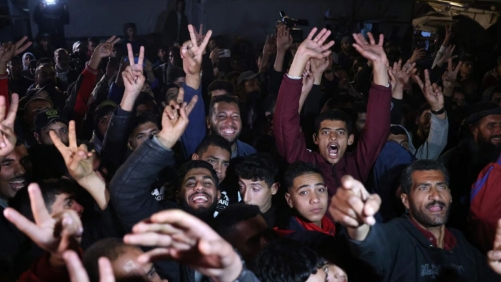Gaza Ceasefire: Israel to Release 737 Prisoners in Truce Deal
AFP | Jerusalem
Email : editor@newsofbahrain.com
The Israeli government announced the release of 737 prisoners and detainees as part of the first phase of a Gaza ceasefire and hostage exchange deal, marking a significant step toward halting the ongoing conflict.
The Justice Ministry confirmed the cabinet's approval of the agreement, which includes the release of these individuals from Israeli custody starting Sunday. This development follows extensive negotiations and intense international mediation efforts.
Ceasefire Details
The truce, set to commence on Sunday, aims to end the deadly hostilities in Gaza, described as the region’s most devastating war to date. It also includes the release of hostages taken during the October 7, 2023, Hamas attack on Israel, in exchange for Palestinian prisoners.
A preliminary list of 95 Palestinians scheduled for release includes 69 women, 16 men, and 10 minors. This exchange will coincide with the anticipated return of hostages held in Gaza, facilitated through secured coordination points.
Rising Tensions Before the Truce
Despite the ceasefire announcement, hostilities have escalated, with Israeli airstrikes reportedly killing over 100 people and wounding hundreds more in Gaza since the deal was revealed. Hamas has warned that continued strikes risk endangering the lives of hostages.
Mediated Agreement
The agreement results from months of diplomatic efforts involving Qatar, Egypt, and the United States. Former U.S. President Donald Trump and outgoing President Joe Biden both claimed credit for their roles in finalizing the deal, highlighting an unusual collaboration between their teams.
Qatari Prime Minister Sheikh Mohammed bin Abdulrahman Al-Thani, who announced the agreement earlier this week, stated that the initial 42-day truce would include the release of 33 hostages. Israeli forces are expected to withdraw from densely populated areas in Gaza to allow displaced Palestinians to return home.
Impact on Civilians
The humanitarian situation in Gaza remains dire, with nearly all 2.4 million residents displaced at least once during the conflict. International aid organizations face immense challenges in addressing urgent needs amid widespread devastation.
Doctors Without Borders coordinator Amande Bazerolle described the crisis: “Everything has been destroyed. Children are on the streets. It’s impossible to prioritize one need over another.”
As the ceasefire prepares to take effect, international observers and humanitarian workers remain focused on ensuring its implementation and alleviating the ongoing suffering of civilians.
Related Posts

